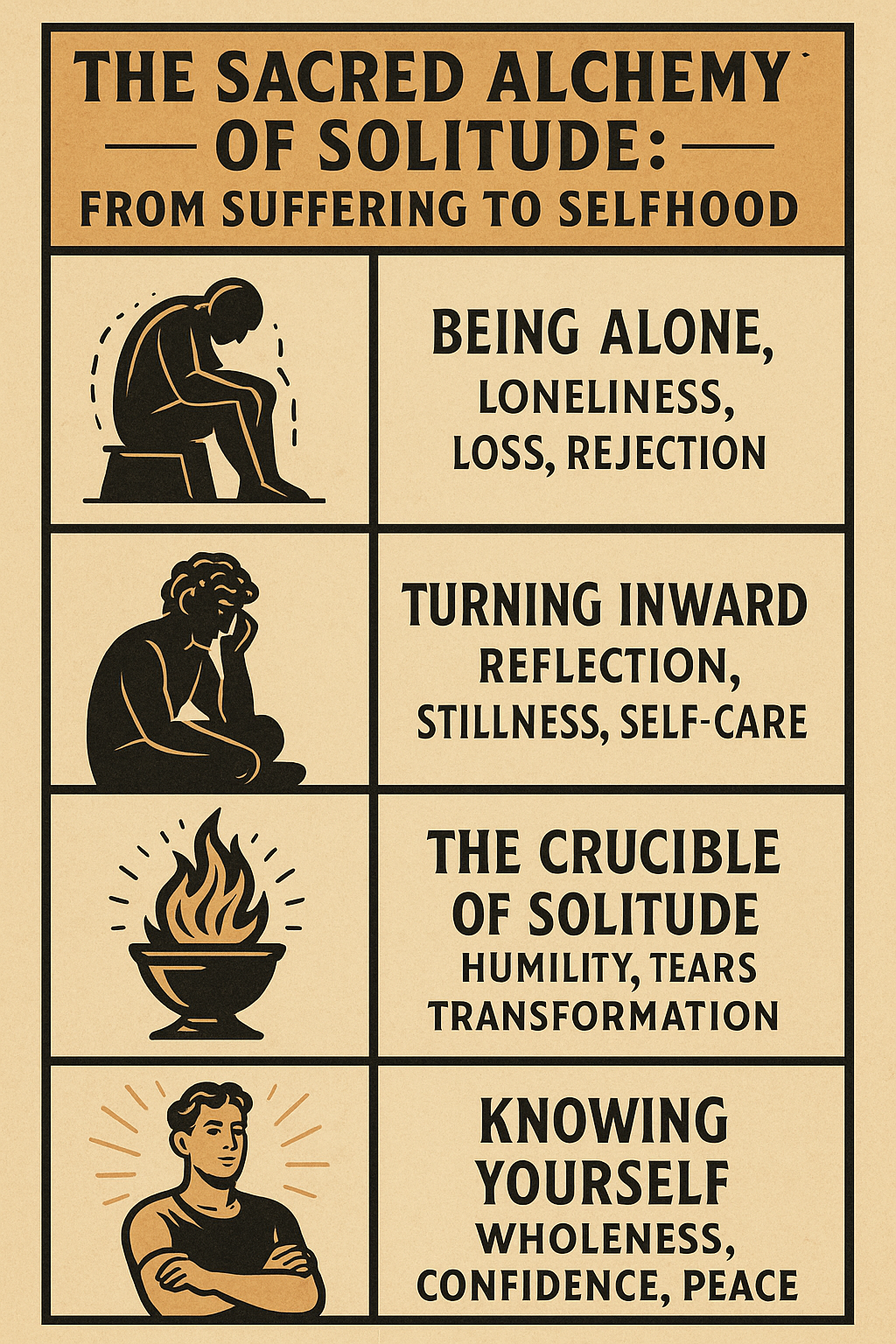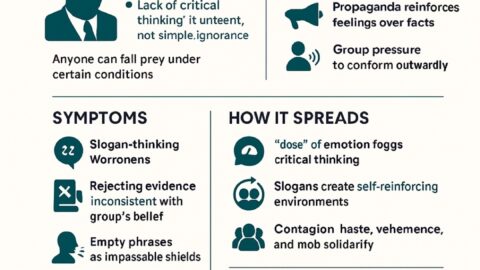Introduction: The Ache of Isolation
There’s a particular ache that comes with being alone — not just emotional, but existential.
It feels unnatural, as though a glitch has broken something fundamental in the design of life itself.
We are born into a world overflowing with people, connection, and noise, and yet, many find themselves drifting alone, silenced by an invisible hand.
In that silence, a painful question surfaces:
Why me?
Yet what if this experience was not a mistake?
What if being alone is not abandonment — but an initiation into something deeper, rarer, and more necessary than comfort could ever provide?
This was the view of Carl Jung, who saw isolation not as a punishment, but as a sacred threshold — a portal into the confrontation and discovery of the true self.
The Purpose of Solitude
When life isolates you, it’s easy to feel forgotten, to believe others are thriving while you are left behind.
But solitude is not rejection — it is preparation.
Those called to deeper work — thinkers, artists, spiritual pioneers — have always walked through wilderness before wisdom.
- The Buddha sat beneath the Bodhi Tree, in utter solitude.
- Jesus wandered alone in the desert for 40 days.
- Carl Jung retreated into profound self-exploration, documenting it in his Red Book.
Each of these figures entered the silence intentionally and emerged transformed.
In solitude, the noise of the world fades, and for the first time, you are left with the only voice that truly matters: your own.
The Real Battle of Solitude
When external distractions fade, your inner world grows loud:
- Buried thoughts,
- Suppressed regrets,
- Unacknowledged fears,
- Forgotten dreams.
It can feel like drowning in your own mind.
This is why most people run. They reach for distractions, relationships, work, anything to avoid facing the truth solitude reveals.
But those who stay — those who face themselves in the mirror of silence — begin a journey that Jung called individuation:
the sacred, painful, heroic process of becoming your true, unified self.
The Role of Pain in Transformation
Pain is often misunderstood.
We are taught to see it as a sign something is wrong.
In truth, pain is often sacred — the fire that burns away illusion.
The discomfort of solitude isn’t senseless; it’s a crucible:
- Burning away false identities,
- Melting down external expectations,
- Forcing a confrontation with the fragmented self.
Through this burning, clarity emerges:
- You recognize relationships built on fear or obligation.
- You see how much of your life has been lived for others’ approval.
- You understand how you abandoned yourself to belong.
And with that clarity comes the opportunity to reclaim your life — not the life scripted for you, but the one that is authentically yours.
The Danger of Misunderstanding Solitude
Yet there is a danger:
- Some mistake solitude for a life sentence.
- They internalize loneliness as unworthiness.
- They spiral into despair, bitterness, self-abandonment.
Jung warned against this:
Don’t identify with suffering. Learn from it, but do not live in it.
Isolation is meant to refine you, not define you.
If you stay trapped in the idea that solitude is punishment, you waste the most fertile ground for transformation you will ever receive.
The Psychological Wilderness: Walking Without a Map
True solitude feels like wandering in a psychological wilderness:
- No guideposts.
- No applause.
- No validation.
But this wilderness is sacred. It is here, and only here, that you can finally ask:
- Who am I beyond the roles I play?
- What do I believe, apart from what I’ve been taught?
- What do I truly want, not just for survival, but for meaning?
And in asking — and enduring the silence — you awaken.
Facing the Shadow: The Crucial Inner Work
In solitude, the Shadow — all the repressed parts of yourself — rises.
- Old wounds,
- Buried anger,
- Forgotten dreams,
- Suppressed instincts.
Shadow work is terrifying because it forces you to accept that:
- You are not purely your virtues.
- You are also your rage, your fear, your pettiness, your hurt.
But Jung taught that integration — not repression — is the path to wholeness.
You do not conquer the shadow. You listen to it. You learn from it.
You bring it into your conscious life, where it can serve you instead of sabotaging you.
In solitude, this integration begins — painfully, courageously, and beautifully.
The Alchemy of Solitude: Turning Pain into Wisdom
Solitude, when embraced with humility and courage, becomes alchemy:
- Silence is transformed into insight.
- Loneliness into self-knowledge.
- Pain into authentic strength.
Most people skim the surface of their own lives, numbing themselves to avoid discomfort.
But those who stay in the fire emerge differently:
- Grounded,
- Clear,
- Unshakable.
They no longer need external validation because they have met themselves — fully and honestly — in the silence.
The Return: Integration into the World
After solitude, you do not return unchanged.
- Relationships misaligned with your growth may fall away.
- Old passions may lose their grip.
- New dreams, clearer and more authentic, emerge.
You are no longer motivated by approval.
You choose from alignment with your soul, not fear of loneliness.
And your presence changes.
You no longer need to prove yourself.
You become a lighthouse — steady, calm, authentic.
Others will feel it.
Without even trying, you become a reminder to them that it’s possible to live differently — from the inside out.
The Solution: How to Embrace Solitude Properly
If you find yourself in a season of isolation:
- Stop resisting.
Trust that this silence has a purpose. - Listen deeply.
Not to external voices, but to the stirrings within your unconscious mind. - Face your shadow.
Welcome the hidden parts of yourself without judgment. - Stay with the discomfort.
Transformation takes time. Don’t rush the process. - Honor the changes.
Let new dreams, values, and boundaries emerge naturally. - Integrate your truth into your external life.
Your growth is not for solitude alone.
Bring it into the world — quietly, firmly, authentically. - Become your own home.
Learn to belong to yourself, so that nothing external can ever truly uproot you again.
The Sacred Gift of Solitude
Solitude is not isolation.
It is the sacred fire through which the fragmented soul becomes whole.
Those who walk through it — honestly, humbly, courageously — emerge not as victims of loneliness, but as architects of authenticity.
“Your vision will become clear only when you look into your heart. Who looks outside dreams; who looks inside awakens.”
— Carl Jung
If you are in solitude, know this:
You are not being punished.
You are being reborn.
Not back into who you were —
but forward into who you were always meant to become.
And that… is the rarest, most beautiful transformation of all.
THE SACRED ALCHEMY OF SOLITUDE: FROM SUFFERING TO SELFHOOD
The Journey Into Solitude
The Ache of Isolation
- Solitude feels painful and unnatural, raising the question: “Why me?”
- Carl Jung taught that isolation is not punishment, but initiation into a deeper self.
The Purpose of Solitude
- Spiritual leaders and thinkers (Buddha, Jesus, Jung) found transformation through isolation.
- Solitude creates the necessary silence for inner discovery.
The Real Battle of Solitude
- With distractions gone, buried fears, regrets, and suppressed dreams surface.
- Most flee back to noise; few endure and confront their true selves.
Reflection:
Isolation is not rejection — it is preparation for awakening.
Transformation Through Solitude
The Alchemy of Solitude
- Pain becomes purification; loneliness becomes insight.
- Shadow work emerges: confronting hidden fears and integrating the whole self.
- Solitude refines you into an authentic, grounded presence.
The Return: Living Authentically
- You re-enter life with deep self-knowledge.
- Old habits, shallow relationships, and false identities fall away.
- You become a lighthouse for others: steady, calm, authentic.
The Solution
- Embrace silence, face discomfort, stay present.
- Listen to your unconscious mind.
- Integrate your shadow with compassion.
- Live from alignment, not fear or approval-seeking.
Final Thought:
“Who looks outside dreams; who looks inside awakens.” — Carl Jung
Solitude is not exile. It is the crucible where your truest self is revealed.







